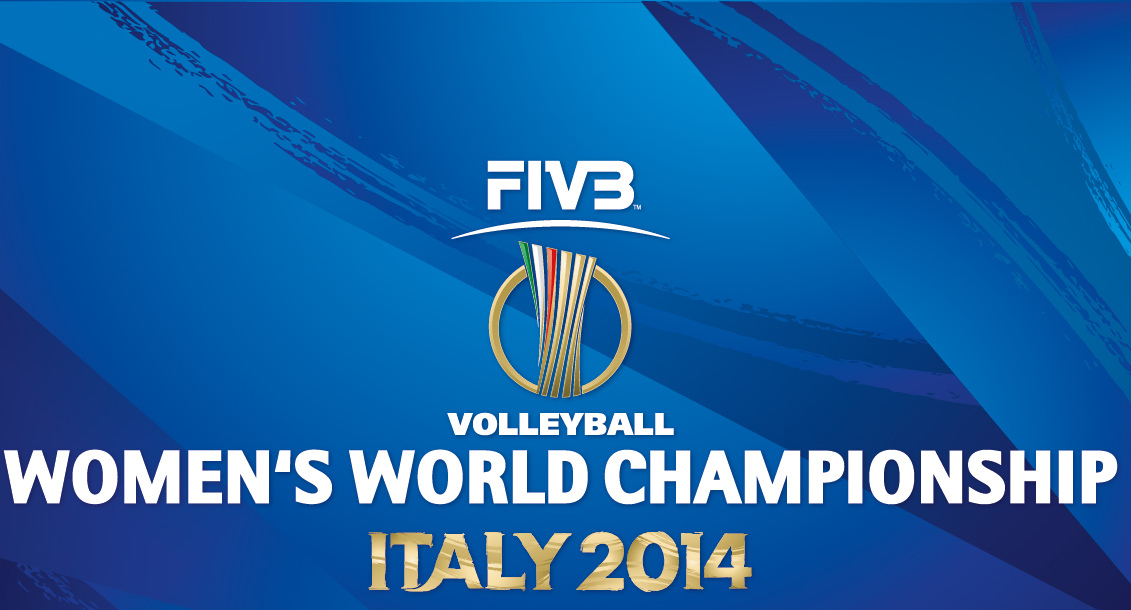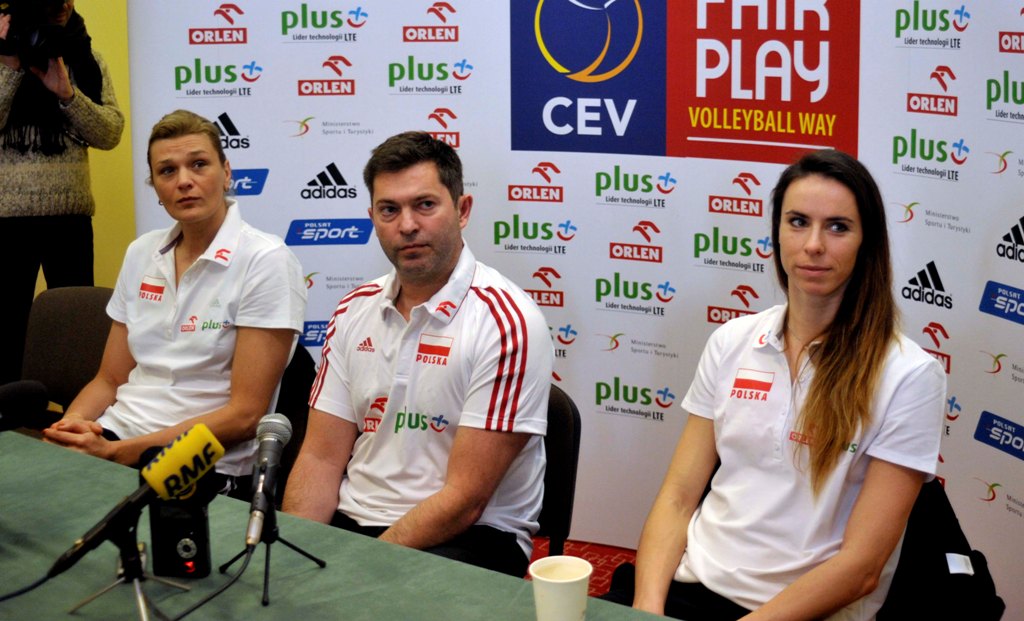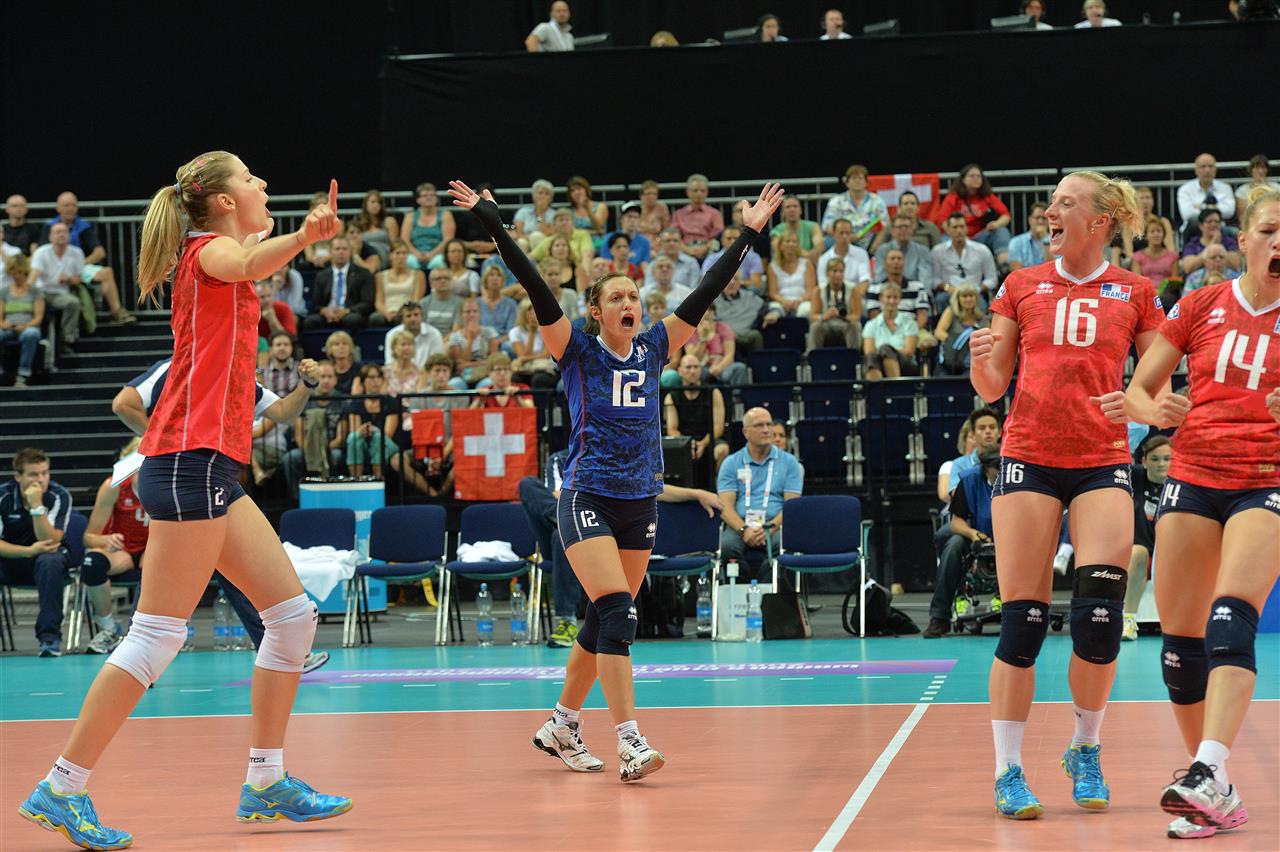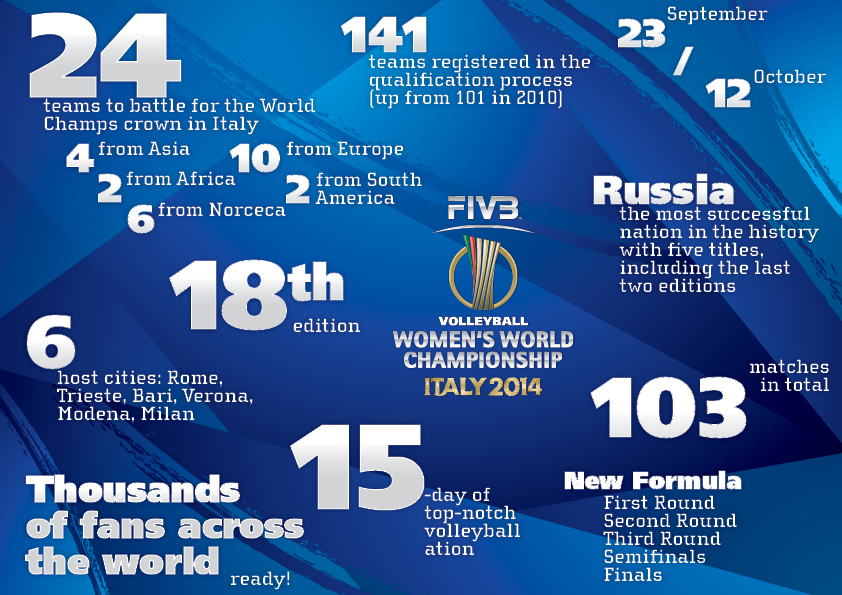The following teams will represent Europe at the 2014 Women’s World Championship:
Azerbaijan
Turkey
Bulgaria
Croatia
Belgium
Serbia
The Netherlands

The following teams have already qualified for the 2014 FIVB Men’s World Championship: Poland (host), Argentina, Brazil, Australia, South Korea, Iran, Venezuela, China, Russia and Italy.
Pool I: Cyprus, Romania, Ukraine and Turkey (host)
Jan 3rd:
Turkey 3-0 Cyprus
Romania 3-2 Ukraine
Jan 4th:
Turkey 3-0 Ukraine
Romania 3-0 Cyprus
Pool J: Azerbaijan, Estonia, Israel & Serbia (host)
Jan 3rd:
Serbia 3-0 Estonia
Azerbaijan 3-1 Israel
Jan 4th:
Serbia 3-0 Israel
Azerbaijan 3-0 Estonia
Pool K: Belgium, Spain, Switzerland & Poland (host)
Jan 3rd:
Belgium 3-0 Spain
Poland 3-0 Switzerland
Jan 4th:
Belgium 3-0 Switzerland
Poland vs Spain
Pool L: France, Hungary, The Netherlands & Croatia (host)
Jan 3rd:
The Netherlands 3-0 France
Croatia 3-0 Hungary
Jan 4th:
The Netherlands 3-0 Hungary
Croatia vs France
Pool M: Belarus, Czech Republic, Slovakia & Bulgaria (host)
Jan 3rd:
Bulgaria 3-1 Slovakia
Belarus 0-3 Czech Rep
Jan 4th:
Bulgaria 3-0 Czech Rep
Belarus vs Slovakia

Glinka To Lead Poland…
Released by cev.lu on January 2nd, 2014:
On Friday in Lodz, Poland, the four teams from Pool K – Poland (15 in the FIVB World Ranking), Belgium (22), Spain (42) and Switzerland (104) – will begin their campaign for a spot in the Final Round of the 2014 FIVB Women’s Volleyball World Championship hosted by Italy in September.
The hosts have their reasons to believe in their chances for home success – for the first time since many years the coach, Piotr Makowski, managed to really gather the best Polish players to wear the jersey of the national team. It is the season of great comebacks. The stars from some of the most memorable moments in history for women’s Volleyball in Poland are back in action, including Malgorzata Glinka-Mogentale, a double European champion in 2003 and 2005 who was also the Best Scorer of the 2003 edition in Turkey. Middle-blocker Eleonora Dziekiewicz and wing-spiker Anna Werblinska (formerly known as Baranska) were among those who anchored the team to bronze at the 2009 European Championship whose finals were held in Lodz.
“We did a good job during the very short time that we had to practice together,” said Glinka-Mogentale during a press conference held shortly before the start of the tournament. “This is a team built just for this tournament; we don’t know what will happen afterwards.”
The fourteen players who form the national team are a good mix of youth and experience. According to the coach, this is the right way to bring Poland back to the world’s Volleyball elite. They have had a difficult time lately as they were not retained among the elite teams starring in the 2014 edition of the FIVB World Grand Prix and finished only eleventh at the 2013 CEV Volleyball European Championship co-hosted by Germany and Switzerland. Now they are hoping for a new, fresh start.
“We are experienced and we have played together before,” said setter Izabela Belcik, who is also coming back to the national team for this tournament. “During practices we concentrated on communication and on how to get along with each other. It was a short, but successful camp. We are in good shape.”
But other teams from Pool K are also eager to start the competition in Lodz. The White-Reds biggest rivals will be Belgium, who caused a sensation at the European Championship. They beat the odds and won bronze in the end after edging titleholders Serbia. Spain and Switzerland may be considered the underdogs when it comes to their chances to pose a threat to Poland and Belgium, but it is certain that the tournament in Lodz will be interesting and exciting, both for the players and the fans.
On Friday Spain will face Belgium at 5:30pm local time, followed be the match Poland vs. Switzerland at 8:30pm local time.
The winners of the five third-round qualifiers together with the two second-placed teams with the best score will complete the European contingent for the 2014 Worlds thereby joining hosts Italy, 2013 European champions Russia and the silver medalists from the 2013 European Champs Germany.
Click here for more info and a detailed schedule of the World Champs qualifier in Lodz
France Reveals Final 12
Released by cev.lu on January 2nd, 2014:
France women’s national team flew yesterday to Croatia to participate in the third-round World Champs qualifier taking place through January 3-5 in Rovinj. 12 players were finally retained by head coach Mauricio Paes and assistant Magali Magail for the third and last stage of the World Champs qualification process with France debuting on Friday against the Netherlands before playing hosts Croatia and Hungary on Saturday and Sunday. The team captained by Armelle Faesch will try to make the Final Round of the World Champs for the first time in 40 years.
“We had a quite long journey to arrive in Rovinj but the players are in good shape” Paes says. “Similarly to many other teams we started our preparations for the World Champs qualifiers only a couple of weeks ago and our players were tired after a very intensive schedule playing with their respective clubs in the national league as well as in the European Cups. Christina Bauer, who last week was ill as we flew to Bulgaria, has fully recovered. At the end of our camp, I have retained 12 players and decided to appoint Armelle Faesch as our captain. She is back in the group and this is going to motivate all other players. It is very important that the leader of this group is a player that has got the necessary international experience, so quite naturally I finally opted for Armelle. The players are all very committed and motivated, though they also look a little worried.
We know that we are going to play three strong teams but this does not distract us from our goal: to qualify to the Final Round of the World Champs” Paes continues. “The first step on our way to Italy 2014 will be our opening game with the Netherlands on Friday”.
The 12 players nominated by Mauricio Paes for the tournament in Rovinj are: Christina Bauer, Camille Crousillat, Armelle Faesch, Elisabeth Fedele, Alexandra Jupiter, Myriam Kloster, Maëva Orlé, Déborah Ortschitt, Alexandra Rochelle, Hélène Schleck, Astrid Souply, and Mallory Steux.
The FIVB Previews 2014 World Champs
Released by FIVB.ORG on January 2nd, 2014:
Olympic gold, victory at the World Grand Prix, and success in the World Grand Champions Cup: Brazil’s volleyball ladies have won every title on offer of late. As such, it is almost impossible to believe that the skillful South Americans are still waiting for their first ever World Championship title. If the form book is anything to go by, however, this is all set to change this year when Italy hosts the highlight of the 2014 season – the 17th FIVB Volleyball Women’s World Championship from September 23 to October 12.
“After the dream year we experienced in 2013, it goes without saying that we will be striving to finally get our hands on this title,” said Brazil’s successful coach Ze Roberto. However, a glance at the history of the World Championship reveals exactly why Ze Roberto is wary of the threat posed by one team in particular: defending champions Russia. The Russian giants defeated Brazil in the final to win the World Championship title in 2006 and 2010, meaning the Brazilians’ three silver medals (including 1994) remain their greatest success to date in the World Championship. “Russia is difficult every time. They are very talented. They have not had all their top players on board recently, however,” was Ze Roberto’s assessment of his arch-rivals.
The relative lack of top players resulted in the Russians having to ‘settle’ for the European Championship title in 2013 – they failed to qualify for the final round at the Grand Prix and are still yet to claim a podium at the Grand Champions Cup. Talisman Lioubov Sokolova-Shashkova made her comeback at the latter of these events. And, with a view to a possible hat-trick of World Championship titles, the tournament in Italy could see one of the tallest volleyball ladies of all time return to the team: 2.02m tall Ekaterina Gamova. Her possible inclusion in the squad is the subject of much discussion among volleyball fans in Russia.
“It may take some time. At the moment we need to communicate a little bit more with Ekaterina. Thereafter, we will draw certain conclusions. This season she is, as always, the leader of her team. Gamova is one of the best players in our Super League,” said national coach Yury Marichev. Alexander Yaremenko, Secretary General of the Russian Volleyball Federation, wants to see both old hands on board for the World Championship: “We are in the era of longevity in the sport now. I think about 30 years is the golden age for volleyball players. Luba is a good acquisition for the Russian team. As for Gamova, she decided to stop playing for the team, but her plans have changed now.”
Russia’s female volleyball stars have their reputation as the most successful nation in the history of the World Championship to defend: together with Russia’s predecessor – the Soviet Union – they have won a total seven titles. Cuba and Japan have both triumphed on three occasions, China twice, and World Championship hosts Italy once (2002). The Squadra Azzurra is a new-look Italian team, built around top attacker Valentina Diouf, who was the highest-scoring player of the final round of the World Grand Prix with 110 points.
China finished second behind Brazil at the World Grand Prix, making them one of the favourites to challenge at the World Championship. The team has made remarkable progress in a short time under the guidance of the returning “Jenny” Lang Ping, who won silver as the US coach at her home Olympics in Beijing in 2008. Also on the up again are the Japanese, who were still in contention for the title at the Grand Champions Cup until the decisive duel against Brazil (0:3). The skill level of Japan improved a lot in recent years, especially since winning bronze at the London Olympics. Technique-wise they are a very dangerous team for us. So I feel some kind of threat to us, especially in the 2016 Rio Olympics,” said Ze Roberto of the Asians. They are hungry for the title, having last won World Championship gold back in 1974.
It goes without saying that Olympic silver medallists USA, whose most recent success at the World Championships came in the form of second place in 2002, are always hotly fancied. However, volleyball legend Karch Kiraly’s team must first secure qualification. The five qualification tournaments in the NORCECA confederation (each with four teams) will not be played until May and June. The winner of each group will qualify for the World Championship, while the group runners-up go through to a play-off for the final place from July 2 to 7. It is straight down to business in the new year in Africa, where the destination of the two World Championship tickets will be decided in two tournaments, each featuring seven teams. In Europe, it is a case of now or never at the tournaments in Turkey, Azerbaijan, Poland, Croatia and Bulgaria from January 3 to 5. The five pool winners plus the two best runners-up will travel to the tournament in Italy.
Nine countries have already booked their places: host Italy, defending champions Russia and Germany from Europe, Brazil and Argentina from South America, and Japan, China, Thailand and Kazakhstan from Asia. A record number of 141 countries took part in the qualifying process for the World Championship – a big increase on the 101 that did battle for a ticket to the finals in 2010.
Italy will host the women for the first time ever. As one of volleyball’s strongest and proudest nations, the best of women’s volleyball will have a wonderful stage to perform on, especially after an outstanding standard was set during the FIVB Volleyball Men’s World Championship in 2010. A total of six cities – Rome, Trieste, Verona, Bari, Modena, Milan – will host the FIVB’s premier tournament for women.
The FIVB Volleyball Women’s World Championship will feature 24 teams divided into four pools of six teams for the first round, which will be a round-robin system over five days – three matches per day – with four cities (Rome, Trieste, Bari and Verona) hosting a pool each. The top four teams of each pool will advance to the second round (in Bari, Trieste, Verona and Modena), where the 16 teams will be split into two pools of eight (top two of Pool A and B, third and fourth of Pool C and Pool D), with the top three of each pool advancing to the third round.
The top three teams from the two second-round pools will advance to the third round with the winners, placed in each pool, while the second and third will be drawn. The third and final round will consist of a round-robin system, with the top two teams of each pool advancing to the semi-finals before the final takes place in Milan on October 12. Will this be the day, on which Brazil wins its first ever World Championship title?
Click here for the latest press releases from CEV.LU
Click here for the latest press releases from FIVB.ORG




